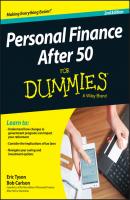Personal Finance After 50 For Dummies. Tyson MBA Eric
Чтение книги онлайн.

Читать онлайн книгу Personal Finance After 50 For Dummies - Tyson MBA Eric страница 2
Название: Personal Finance After 50 For Dummies
Автор: Tyson MBA Eric
Издательство: John Wiley & Sons Limited
Жанр: Зарубежная образовательная литература
Серия: For Dummies
isbn: 9781119118831
isbn:
For example, consider the types of questions we, your humble authors, have been asked from folks in our advisory businesses:
✓ Can we afford to retire? How much can we comfortably spend per year given our assets?
✓ My employer is offering me pension options. How do I choose among them?
✓ I just left my employer (by choice or through layoff) and have some money in a retirement account. What should I do with it?
✓ How should I manage my investments now and in the years ahead? When should I begin collecting Social Security benefits?
✓ What’s the process for withdrawing money from my retirement accounts, and how can I minimize my tax hit from doing this?
✓ Should I buy an annuity? If so, what type? Are reverse mortgages a good idea?
✓ What types of additional medical insurance – long-term care insurance, Medicare supplement, and so on – do I need pre- and post-retirement?
✓ An agent is telling me to buy more and different life insurance. How much do I need and what type of life insurance should I buy?
✓ Do I need a will? Do I need an estate plan? What should I do to protect my spouse, children, or significant others?
We wrote this book to answer these questions and many more that face you as you age and grapple with your finances during your senior years. We hope to not only answer your questions but to also make you aware of important issues you may not be aware of so you have plenty of time to consider them and make decisions that enhance your financial independence.
Everyone needs to make financial decisions. Whether you’re rich, middle class, or poor, 50 or 85 years old, retired, or still working two jobs, money passes through your hands every day. No matter your situation, we’re excellently positioned to give you sound financial advice on the range of issues presented in this book. We each have decades of professional experience in the financial services industry; we each have extensive training and background to provide expert personal financial and retirement advice; and we both communicate in plain English with our readers, operate free of conflicts of interest, and interact with people like you with real financial problems that need solutions.
Eric started as a management consultant in the financial services industry and then worked as a personal financial counselor. Now he’s an author and the proprietor of www.erictyson.com. Eric is a trained economist who graduated with honors in Economics from Yale University. Bob is Chairman of the Board of Trustees of the Fairfax County Employees’ Retirement System, which has more than $3 billion in assets. He has served on the board since 1992. He’s also the editor of the monthly newsletter, Retirement Watch. Bob received his JD and an MS in Accounting from the University of Virginia and received his BS in Financial Management from Clemson University and passed the CPA Exam.
We also have established a few conventions to help you navigate through this book: First, although we’d like to believe that you want to pore over every last word between the two yellow and black covers, we make it easy for you to identify “skippable” material – information that’s interesting but not essential: text in sidebars (the shaded boxes that appear here and there) and paragraphs marked with a Technical Stuff icon. Second, we put all web addresses in monofont for easy identification. If a web address breaks across two lines of text, just type it in exactly what you see it in this book, pretending as though the line break doesn’t exist. (If you’re reading this book online, simply click the link to go to the webpage.) Finally, we refer to the decade from 2000 to 2009 as the 2000s. We just wanted to avoid any confusion in case you were thinking of the year 2095.
When writing this book, we made some assumptions about you:
✓ You’re age 50 or older (or rapidly approaching that age) and are approaching or are in retirement.
✓ You’re still in the workforce and have no plans to retire, which is fine and compatible with our approach in this book too.
✓ You want expert advice about important financial topics, and you want easy-to-understand answers.
✓ You want a crash course in personal finance and are looking for a book you can read to help solidify major financial concepts and get you thinking about your finances in a more comprehensive way.
Throughout this book, we offer many resources, including websites and online tools to help you, as well as plenty of alternative off-line resources and assistance.
The icons in this book help you find particular kinds of information that may be of use to you. Here’s a rundown of what each icon means:
In addition to the material in the print or e-book you’re reading right now, this product also comes with some access-anywhere goodies on the web. Check out the free Cheat Sheet at www.dummies.com/cheatsheet/personalfinanceafter50 for information about employer pensions and go to www.dummies.com/extras/personalfinanceafter50 for articles that explain the evolution of long-term care, offer advice on how to answer Medicare questions, and more.
This book is organized so you can go wherever you want to find complete information. Want advice on managing and tracking your expenses in retirement? See Chapter 6. If you’re interested in investing strategies and developing a retirement plan, cruise on over to Part II. If you’re not sure where you want to go, you may want to start СКАЧАТЬ